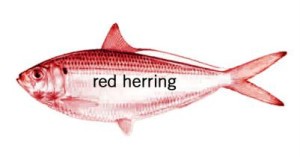Red herring
- a smoked herring.
- something intended to divert attention from the real problem or matter at hand; a misleading clue.
A reviewer once said of one of my books, “Lilley has cornered the market in red herrings.”
I’m not sure whether that’s a slam or a compliment, but I do love planting a good red herring in my mysteries. One of the best red herrings of all time was The Red-Headed League. In this fun Sherlock Holmes story, the “league” is a falsehood to cover a bank robbery.
What makes some red herrings good, and others stink like yesterday’s…well, red herring?
Camouflage
Red herrings shouldn’t scream, “Hey, I’m a clue!” from the rooftops. Readers are smart, and they’ll be working to solve the mystery as they go. They don’t need you to stomp on ’em. The subtlety rule applies to all clues, not just to red herrings.
A fish before dying
You can plant a red herring before your victim turns up dead, right at the beginning of your story. At that point, your reader doesn’t even know who is going to get killed, much less whodunnit.
Dead fish need not apply
All clues, including red herrings, must serve to move your story forward. Don’t use your red herrings only as a way to throw the reader off. Make them integral to your plot or character-building.
Two-faced fish
In some of my books, I wasn’t sure who the villain was until very near the end of the writing process. I write all the clues so that any of them can be red herrings or valid clues, depending on the ending.
Are there any other rules that you follow when writing red herrings? What are some of your favorite red herrings in crime fiction?


Congrats, Kathryn. I think cornering the market on red herrings is an honor for a mystery writer!
As a former close-up magician, I like the idea of misdirection. Have more than one thing going on in a scene, and while the reader’s concentration is here, over on the other side you’ve dropped something in that passes notice…until you need it.
Kathryn, I’m not sure I’m very good at red herrings – certainly not up there with the best:) (ie. you)! I do like misdirections that help explore character but I always have to be careful as I have a tendency to overcomplicate things. Yes my red herrings sometimes start to swin off by themselves and start their own story – little buggers…
Jim, I love misdirection too–The Red-Headed League is my all-time favorite in that category. Clare, I think maybe that critic was implying I let my red herrings form their own school and swim away with the plot, lol.
I’m writing my first real attempt at a mystery. It’s really rather comforting to see you say you write clues that could be real or red herrings. Now I don’t feel so guilty. Still don’t know whodunnit of course.